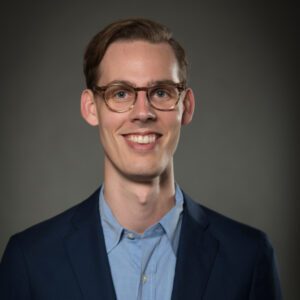Nanotechnology at Northwestern
Meet Benjamin Partridge, a postdoctoral fellow in the Mirkin Research Group
February 22, 2022
Benjamin Partridge is a postdoctoral fellow in the Mirkin Research Group, which focuses on developing methods for controlling the architecture of molecules and materials on the 1 – 100 nm length scale, understanding their fundamental properties, and utilizing such structures to develop novel tools that can be applied in the areas of chemical and biological sensing, gene regulation, immunomodulation, lithography, catalysis, optics, and energy generation, storage, and conversion.
 Where are you originally from?
Where are you originally from?
I’m from Hull, a port city in the north-east of England.
Where did you complete your undergraduate degree?
I completed my undergraduate studies at the University of Oxford, UK, affiliated with Lincoln College.
When did you first become interested in chemistry?
I’ve enjoyed science for as long as I can remember, but the moment that really sold me on chemistry happened at a chemistry summer camp when I was 15. Among various activities, such as making flubber (from the Robin Williams movie of the same name), I made aspirin – my first organic synthesis. The fact that I could make something I’d find in the local pharmacy blew my mind, and since then I’ve been hooked!
How do you explain what you study to non-scientists?
My work in the Mirkin Group focuses on repurposing DNA – the blueprint of life – to program how proteins assemble into novel materials with sophisticated structures. Proteins are essential building blocks that perform a vast array of functions in living systems, such as catalyzing reactions, acting as gatekeepers on cell surfaces, and triggering immune responses. Designing new synthetic materials that can utilize the inherent functionality of proteins will positively impact problems across human health, energy, and the environment.
What are the challenges you’re trying to solve with programmable nanomaterials? And what kind of potential do you see for them?
To harness the potential of proteins in synthetic materials, we need to be able to control their assembly. However, this is challenging because proteins have complex chemical surfaces that engage in multiple non-specific interactions. Consequently, how proteins assemble is difficult to predict and even harder to control.
We’re overcoming this challenge by developing strategies to replace these unpredictable protein-protein interactions with predictable DNA-DNA interactions, enabling us to synthesize new protein-based assemblies. Protein-DNA materials developed using our strategies are promising for catalysis, selective transport, and wound healing.
What has been a highlight of your time at Northwestern?
My highlight has been (and continues to be) seeing students grow and develop as independent scientists. It has been a real pleasure to see graduate students I’ve worked with gain confidence, become more independent, and tackle ever bigger scientific questions. The atmosphere here at Northwestern is conducive to helping researchers reach their full potential and it’s been great to benefit from that and play my part in helping others to do the same.
What has been the most challenging aspect of your work or your time at Northwestern?
The pandemic has, of course, been a substantial challenge to everyone. I’ve particularly missed the casual interactions and conversations in the hallway that are difficult to reproduce via Zoom. That said, I’ve been incredibly fortunate that the Mirkin Group is supported by a team of phenomenal staff. They, and particularly our lab manager, Dr. Tanushri Sengupta, have worked tirelessly to minimize the disruption on our research. I’m very grateful for all their efforts!
Can you tell me about your experiences either being mentored or mentoring others?
I’ve benefited from fantastic mentors and mentees while at Northwestern. My primary mentor, Prof. Chad Mirkin, has given me a lot of freedom and independence to explore my ideas and acquire new technical skills. Chad has also been incredibly supportive of my goal to be an independent faculty member, helping me develop crucial skills such as mentoring students, preparing grant proposals, and communicating our science to the broader community. I’ve also appreciated lots of advice and guidance from Prof. Will Dichtel.
I’ve also had the opportunity to mentor several fantastic graduate and undergraduate students. It’s been very rewarding to see them gain independence, run their own projects, and go on to mentor students themselves. I’m invested in their success both within the group and beyond and I can’t wait to see what the future holds for each of them!
What are your hobbies outside of the lab?
Outside lab I’m a self-proclaimed “AVgeek” – a big fan of aviation, not just planes themselves but also the logistics of airports and airlines. I also enjoy cooking, getting outdoors, and traveling, in particular exploring the Midwest over the past couple of years.